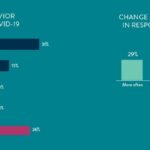The Legal Cannabis Industry’s Opportunities to Cultivate Social Equity

Lotame and New Frontier Data Partnership Connects Big Brand Advertisers to More Than 100 Million CBD Consumers
July 8, 2020
States’ Legal Cannabis Markets See Strong Growth Amid COVID-19 Disruptions
July 19, 2020By Josh Adams, Ph.D., Senior Industry Analyst, New Frontier Data, and
Molly McCann, Ed.D., Director of Industry Analytics, New Frontier Data
Last week’s Cannabit discussed the design, intent, and some shortcomings of Social Equity Programs (SEPs) in legal cannabis markets. SEPs acknowledge the extensive and ongoing damage done to Black and Brown communities through criminalization and the selective enforcement of cannabis laws, and are intended to provide support and accommodations (often in the licensing process) to individuals and communities systematically disadvantaged by cannabis prohibition. Challenges remain: SEPs yet fail to address many of the substantive barriers to entry within the legal cannabis market. Recognizing the limited reach of SEPs, some advocates in the industry are trying to address systemic inequity from within.
Criminal Records as Barrier to Entry
Many of those who entering the legal cannabis industry have experience operating in previously unregulated markets. Given the disparate arrest rates for cannabis-related offenses between White Americans and people of color (particularly Black men), it stands to reason that Black people operating in the unregulated industry are more likely to have criminal records. That creates significant barriers, most notably being excluded from qualifying for the necessary licenses to operate legal, regulated cannabis businesses.
Initiatives such as the Last Prisoner Project (LPP) have been established in the wake of state-level cannabis legalization with a distinct focus on social justice. Specifically, the LPP has concentrated on three specific areas: release of prisoners being held on cannabis-related charges, clearing criminal records via expungement and clemency, and establishment of restorative reentry programs. Many leading industry organizations have partnered with the LPP, both to support and advance the cause of mitigating decades-long harm from the war on drugs, as well as creating an environment where those directly impacted by the repressive enforcement of cannabis prohibition might find a place in the industry.
Similarly, Cage-Free Cannabis is an organization focused on repairing the damages of the war on drugs, particularly for communities of color. Cage-Free Cannabis concentrates on the themes of reparative, economic, and environmental justice. Reparative justice initiatives focus on the expungement of criminal records related to the war on drugs. Of note, Cage-Free Cannabis’s economic justice program seeks to create industry jobs for communities of color in conjunction with ongoing advocacy for equity within the larger cannabis industry.
The Minority Cannabis Business Association (MCBA) describes its mission as creating “equal access for cannabis businesses and promote economic empowerment for communities of color by creating policy considerations, social programming, and outreach initiatives to achieve equity for the communities most affected by the war on drugs.” Again, in partnership with established cannabis businesses, the MCBA is able to build industry coalitions to collectively advocate for and advance the interests of those communities most impacted by the war on drugs, while working to integrate those communities into the broader cannabis industry to help them benefit from economic opportunities available in the space.
Constrained Access to Funding
The systemic factors that have disproportionately impacted communities of color are compounded by additional barriers currently inherent in the regulated cannabis industry. Foremost among those barriers is the limited access to traditional banking, which not only constrains normal business operations but makes it difficult, if not impossible, to secure funding for a cannabis business.
Furthermore, for communities that have experienced economic decline, over-policing, and structural disadvantages via discriminatory redlining practices, there is generally a dearth of surplus capital or generational wealth to fund an expensive, highly regulated business.
Informal networks can play a crucial role in accessing capital to fund the start-up phase of new businesses. Often the networks are developed through social proximity, shared social class, or through institutions such as college or private clubs. Such networks are also broadly different for White Americans than Black and Brown Americans, either because of historic inequalities or ongoing systemic discrimination. That only serves to emphasize the role of the industry in creating and supporting networking opportunities for communities of color, and connecting them to similarly informal structures that can provide new opportunities for funding, mentorship, and collaborative partnerships.
The cannabis industry has high barriers to access, particularly the capital required for regulatory and legal compliance. Further, within a crowded and competitive landscape, brand and product development are resource-intensive endeavors. For individuals who are effectively cut-off from many traditional funding sources and do not have accrued capital of their own, start-up costs for a retail cannabis business are prohibitive.
Holding Companies Accountable
In the wake of protests over George Floyd’s killing and ongoing demonstrations against police brutality and for racial justice and equity, businesses across all industries acknowledged the need to take action to deconstruct systemic racism in society, both broadly and within their own organizations. Yet for many, the action and advocacy stopped there.
As an industry built more directly on the imprisonment and harassment of Black and Brown Americans, many cannabis businesses likewise acknowledged the need for change, while others remained conspicuously silent.
Cannaclusive has published The Accountability List to help conscious cannabis consumers identify which companies not only pledged to “do better” while black squares were trending online during Blackout Tuesday, but which are also following through on commitments to racial justice. The project is a live, continuously updated spreadsheet of cannabis and hemp brands’ public statements on equity and justice, stated donations and actions, as well as information on Black ownership and employment.
There are also industry initiatives to inform consumers and provide support to cannabis businesses operated by individuals from underrepresented communities. One such resource is the Inclusivebase directory of minority-owned cannabis dispensaries, cultivators, brands, and ancillary businesses around the U.S. maintained by Cannaclusive and AlmostConsulting.
Inclusive base’s curated list of cannabis businesses includes designations for ownership by Black, Indigenous, Latinx, and other racial/ethnic minorities, plus ownership by women, LGBTQ people, veterans, and people with disabilities. The resource serves as a tool for consumers to support not only minority-owned businesses, but also small businesses which often exist in the community where those operate.
The Work of Creating a Diverse Industry
SEPs can represent positive initial first steps toward creating a diverse and inclusive industry. However, the communities that SEPs are designed to include generally have fewer resources (particularly accumulated wealth), weaker networks tying them to necessary capital, and less familiarity with regulatory and licensing environments. As such, historically disadvantaged communities require more time and training to understand how programmatic interventions such as SEPs operate, and how communities can best use them to succeed in the regulated cannabis industry.
Further steps are needed, however, to maintain a diverse industry. First, industry participants should recognize that much of the infrastructure, supply chains, and distribution models within the cannabis industry were instituted among the same communities most impacted during the nation’s war on drugs. Corporate leadership structures should be cognizant about the history of the industry, and actively seek to engage those communities. Finally, given the inequity in cannabis-related arrests between White Americans in contrast to Black and Brown Americans, it is incumbent upon the industry not to exclude industry candidates solely because of any cannabis-related convictions.
As an emerging industry, legal cannabis space has a unique opportunity to avoid historically exclusionary business practices and embrace a moral responsibility to include and promote communities scarred by the war on drugs by investing profits from regulated markets for their mutual benefit.




